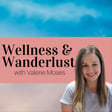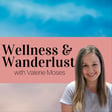
146. Hiking the GR5 Through Europe with Kathy Elkind
Ready for a grand adventure? Tune in to learn all about how one couple hiked across several countries in Europe over the course of a few months.
Today’s guest is Kathy Elkind, author of the new book To Walk It Is To See It. In her late fifties, Kathy and her husband took what they call an “adult gap year” and hiked 1,400 miles across Europe’s GR5.
Kathy shares how they prepared for this adventure and what the journey looked like. In our conversation, we discuss the power of self-compassion, how to navigate this type of trip as a couple, advice for those new to hiking, what to pack for a long-distance trek and much more.
If you enjoy this episode, please feel free to rate and review the podcast on whatever app you’re listening on, and share with a friend!
OUR SPONSOR
This episode is brought to you by Vivoo. Use my code VALERIE20 for 20% off your purchase of Vivoo self-tracking sticks.
- Website: Vivoo.io
- Podcast Episode: Optimizing Our Health Through Biohacking with Miray Tayfun
CONNECT WITH KATHY
Website: https://www.kathyelkind.com/
Instagram: https://www.instagram.com/kathyelkind
Book: https://www.amazon.com/dp/1647425255/
CONNECT WITH THE SHOW
Website: WellnessAndWanderlust.net
Instagram: www.instagram.com/wellnessandwanderlustblog
Facebook: www.facebook.com/wellnessandwanderlustblog
Twitter: www.twitter.com/moses_says

